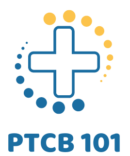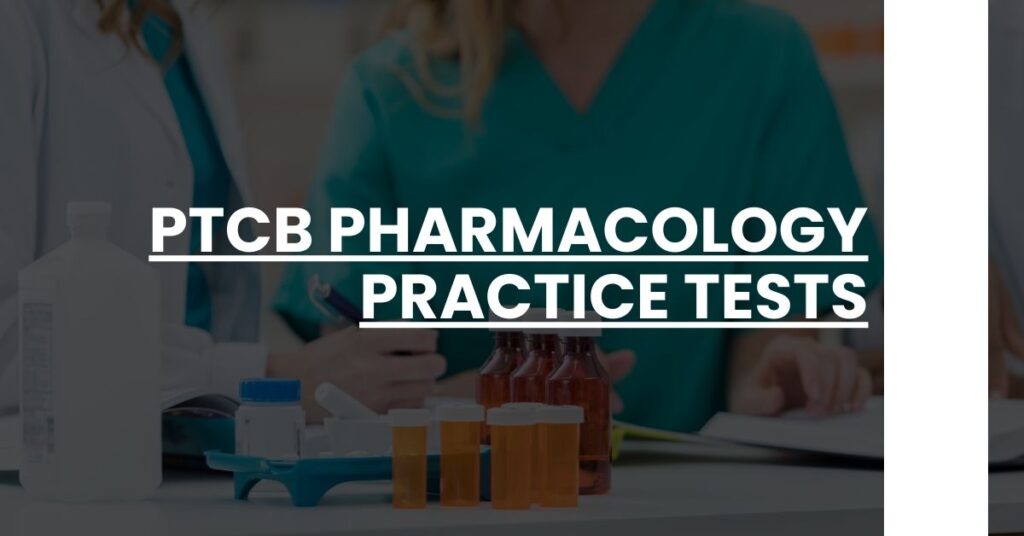PTCB pharmacology practice tests are your key to mastering the Pharmacy Technician Certification Exam.
- Comprehensive Preparation: With PTCB pharmacology practice tests, assess your understanding of medication therapy.
- Targeted Learning: Identify areas for improvement and focus your study time effectively using these practice tests.
- Confidence Boost: Gain the assurance you need come exam day through repeated exposure to pharmacology questions.
Ensure PTCB exam success with strategic practice test use.
- Understanding the PTCB Pharmacology Section
- Importance of Practice Tests in PTCB Preparation
- Strategies for Effective PTCB Study Sessions
- Top Resources for PTCB Pharmacology Practice Tests
- Examining the PTCB Exam Structure and Content Outline
- Insights on PTCB Scoring and Passing Criteria
- Tips for Addressing Common Challenges in Pharmacology Questions
- Personalizing Your Study Plan with Practice Tests
- What to Expect on Test Day: A Pharmacology Perspective
- FAQs about the PTCB Pharmacology Section
- Conclusion: Your Path to PTCB Certification
Understanding the PTCB Pharmacology Section
Pharmacology lies at the heart of pharmacy practice, and thus, it represents a significant portion of the Pharmacy Technician Certification Exam (PTCE). Given its importance, a thorough understanding of pharmacological concepts is essential for any aspiring pharmacy technician.
Key Concepts in Pharmacology
To excel in pharmacology, you must grasp various concepts, including:
- Drug Classifications: Knowing the categories of drugs, such as antihypertensives or antibiotics, and how they are used in therapy.
- Mechanisms of Action: Understanding how drugs produce their effects in the body.
- Side Effects: Being aware of common adverse reactions and drug interactions.
- Dosage Calculations: The ability to calculate appropriate drug dosages for different patients.
By integrating these pharmacological principles into your study routine, you increase your chances of performing well on the PTCE.
Why Practice Tests Are Vital
Utilizing PTCB pharmacology practice tests is a strategic move to reinforce your pharmacological knowledge. Not only do they simulate the exam environment, but they also enable you to identify areas that may require additional study. By consistently challenging yourself with these practice tests, you solidify your grasp on pharmacology, making it easier to recall information during the actual exam.
Importance of Practice Tests in PTCB Preparation
Practice tests serve as a useful barometer for one’s readiness to take the PTCE. By regularly incorporating PTCB pharmacology practice tests into your study sessions, you gain several advantages:
Familiarity with Exam Format
Understanding the structure of questions and the time limits associated with the PTCE is crucial in reducing test-day anxiety. Exposure to practice tests helps build this familiarity, giving you a confidence boost when it matters the most.
Benchmarking Progress
As you pore over practice tests, you start to gauge your strengths and weaknesses. This self-awareness is invaluable, enabling you to tailor your study plan to focus on the pharmacology topics that need the most attention.
Retention Through Practice
The old adage “practice makes perfect” holds particularly true when studying pharmacology. By actively recalling information through practice tests, you strengthen neural pathways and enhance long-term retention of the material.
Approach practice tests as both learning experiences and assessments, and with each attempt, strive for a better understanding rather than a mere higher score.
Strategies for Effective PTCB Study Sessions
When tackling PTCB pharmacology practice tests, your study habits can dramatically influence the outcomes. To optimize your study regimen, consider the following techniques:
Active Recall and Spaced Repetition
Incorporating active recall, where you test yourself on the material, combined with spaced repetition, the technique of reviewing content over increasing intervals of time, can exponentially increase memory retention.
Engaging Multiple Learning Formats
Diversify your study materials. Switch between books, flashcards, interactive practice exams, and instructional videos to keep your study sessions engaging and cater to different learning styles.
Seeking Feedback
After taking each practice test, analyze your performance. Detailed feedback is a powerful tool for improvement. Address each error by revisiting the topic and understanding where your reasoning went awry.
A disciplined and strategic approach to your study sessions allows you to maximize the effectiveness of PTCB pharmacology practice tests and solidify your pharmacological knowledge base.
Top Resources for PTCB Pharmacology Practice Tests
There are several resources available to those preparing for the PTCB. Here’s a roundup of some top picks for honing your pharmacology expertise:
Free Online Resources
- PTCB Practice Test: Offers a selection of free pharmacology practice questions to boost your preparation.
- Pharmacy Tech Test: A free website providing a comprehensive array of practice questions and tests, including pharmacology-focused sections.
Paid Study Materials
- Pharmacy Technician Certified Board Preparation: An investment in a comprehensive study guide usually includes access to a wide variety of practice exams and simulations that mirror the actual test conditions.
By exploring these resources, you can greatly enhance your study sessions with access to diverse, high-quality PTCB pharmacology practice tests.
Examining the PTCB Exam Structure and Content Outline
The PTCE is meticulously structured to evaluate a candidate’s readiness for the role of a pharmacy technician. Understanding this structure is key to effective preparation.
Overview of the PTCE
The PTCE is a computer-based examination consisting of 90 multiple-choice questions. 80 of these questions count towards your final score, and 10 are unscored pretest questions used to calibrate the exam’s difficulty.
Content Outline of the PTCE
The content of the PTCE is divided into several knowledge domains, each encapsulating vital components of pharmacy practice. Although a specific section on pharmacology isn’t delineated, the exam’s content heavily implies the need for comprehensive pharmacological knowledge.
- Medications: You’ll need to know about specific drugs, including their generic and brand names, as well as the therapeutic purposes and effects of these medications.
- Federal Requirements: This section assays your understanding of regulatory aspects, many of which are directly relevant to pharmacology and medication safety.
Familiarity with the PTCE structure and content is a great foundation, but remember to delve deeply into the pharmacology practice tests to ensure you’re prepared for every pharmacological question the PTCE might present.
Insights on PTCB Scoring and Passing Criteria
The scoring system for the PTCB exam may seem opaque at first glance, but understanding it is vital in setting goals during your study process. Unlike a traditional test scored percentage-wise, the PTCB uses a scaled scoring system. Actionable insights from this knowledge can significantly improve your test performance.
Unraveling Scaled Scores
PTCB exam scores range from 1000 to 1600, with the passing score set at 1400. Don’t be misled, though; this doesn’t translate to getting 70% of questions right. Scaled scores adjust for varying question difficulties, ensuring that scores reflect a standardized level of knowledge regardless of the exam version administered.
How to Use This Information
While it might seem like a detail for statisticians, knowing the scaled score system helps you approach your PTCB pharmacology practice tests with a focus on mastery rather than raw scores. The key is consistent performance across all practice tests, indicating readiness for the wide berth of questions you may encounter.
Tips for Addressing Common Challenges in Pharmacology Questions
PTCB aspirants often find pharmacology questions to be among the most challenging. But with focused strategies, you can turn potential stumbling blocks into stepping stones toward success.
Common Hurdles and Solutions
- Memorizing Drug Names: Instead of rote memorization, try grouping drugs by their suffixes or therapeutic classes to create mental anchors.
- Understanding Mechanisms of Action: Involve yourself in active learning—draw diagrams, teach concepts to a peer, or use mnemonics.
- Complex Calculations: Practice an array of math problems daily, and don’t hesitate to revisit foundational math concepts if necessary.
Confronting these challenges during your PTCB pharmacology practice tests ensures you’re not just prepared for the question types but also for the mental agility required on exam day.
Personalizing Your Study Plan with Practice Tests
A tailored study plan takes into account your individual pace, knowledge gaps, and also your lifestyle commitments. Let’s explore how to personalize your approach with PTCB pharmacology practice tests woven in.
Crafting Your Unique Study Regimen
- Assessment: Start with a diagnostic test to gauge your current pharmacology knowledge level.
- Planning: Allocate more time to areas you’re weak in, as revealed by your diagnostic results.
- Execution: Incorporate a variety of practice tests and study materials, mixing in-depth reviews with quick daily quizzes.
Continuously reassessing and adapting your study plan based on performance in practice tests enables you to study smarter. Adjust your focus as needed and keep track of your progress to maintain motivation.
What to Expect on Test Day: A Pharmacology Perspective
On test day, knowing what to expect can quell any jitters and help you perform optimally. The testing environment for the PTCB will be a standardized setting, typically at a designated testing center, and you’ll need to manage your time wisely to answer all questions within the allotted two hours.
Test Day Tips
- Arrive Early: Give yourself ample time to settle in and reduce stress.
- Timing: Be conscious of the clock but do not rush; pace yourself.
- Mindset: Stay calm and collected, relying on the muscle memory developed through your PTCB pharmacology practice tests.
These practical strategies, coupled with your thorough preparation, will empower you to approach test day with confidence.
FAQs about the PTCB Pharmacology Section
Let’s address some common queries to dispel myths and provide clarity on the pharmacology portion of the PTCB exam.
Frequently Asked Questions
- How much time should I spend on pharmacology when studying for the PTCB? Prioritize pharmacology according to your diagnostic test results, shaping your study plan around those insights.
- Where can I find the best PTCB pharmacology practice tests? Explore resources like Pharmacy Tech Test and PTCB Practice Test, ensuring you engage with a multitude of question types and difficulties.
- Are calculations heavily featured in the pharmacology questions? Yes, dosage and calculation questions are integral to the pharmacology section, emphasizing the importance of mathematical competency in your study routine.
By answering these FAQs, we clarify doubts, helping you focus on effectively preparing for your upcoming exam.
Conclusion: Your Path to PTCB Certification
Your journey toward passing the PTCE, especially the nuanced and challenging pharmacology section, is not a simple feat—it requires dedication, effective study habits, and strategic use of PTCB pharmacology practice tests.
Remember, the practice tests are more than assessment tools; they’re an active part of your learning process. They promote a deeper understanding of pharmacological concepts, build your test-taking stamina, and hone your ability to apply knowledge under exam conditions.
With a solid grasp of exam structure, a deliberate and personalized study plan, and the utilization of practice tests, your path to certification is clear and achievable. Engage with the material, challenge yourself with questions above your comfort level, and keep your eye on the goal: a successful career as a certified pharmacy technician.
Use these strategies and insights to guide you through the study process, ensuring that when you sit for the PTCE, you do so with the confidence and knowledge to succeed.

